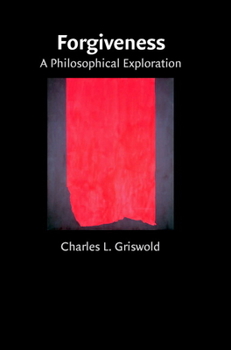Forgiveness: A Philosophical Exploration
Select Format
Select Condition 
Book Overview
Nearly everyone has wronged another. Who among us has not longed to be forgiven? Nearly everyone has suffered the bitter injustice of wrongdoing. Who has not struggled to forgive? Charles Griswold has... This description may be from another edition of this product.
Format:Paperback
Language:English
ISBN:0521703514
ISBN13:9780521703512
Release Date:September 2007
Publisher:Cambridge University Press
Length:270 Pages
Weight:0.86 lbs.
Dimensions:0.7" x 6.1" x 9.0"
Customer Reviews
1 rating
Tough but Rewarding Read
Published by Thriftbooks.com User , 16 years ago
Griswold's project is primarily an analysis of forgiveness from a purely secular standpoint. Though he acknowledges religious influence, he seeks to keep his terms precisely defined for a non-religious paradigm that not only is relevant to private and personal matters, but to public and political as well. The book is both stimulating and insightful in that it offers much wisdom in the way of how interpersonal relationships can be restored, and it offers a rigorous logical construction of the dynamics of apology in both public and private affairs. Essential to Griswold's argument is that forgiveness is a virtue expressed within a moral community. Such a community is interdependent; it is not reducible to the individual and his or her behavior. The consequences of this mean that "the offender depends on the victim in order to be forgiven, and the victim depends on the offender in order to forgive" (pg. 49). With this supposition in mind, Griswold lays out six conditions for the wrongdoer to meet in order to obtain true contrition: 1) responsibility, the offender takes the moral blame for their actions; 2) repudiation, the offender disavows the wrongful deeds; 3) regret, the offender must show remorse for the aberrant actions; 4) reform, the offender must commit to being a different person and express that it is unacceptable to repeat the offense; 5) Reimagination, the offender shows an understanding of how the injured party feels; and 6) retelling, the offender is able to recount the events that lead the wrongdoer to do wrong without making excuse or minimizing the issues relevant to the wronged (pgs. 49-51). If these conditions are sufficiently met one may warrant forgiveness. In order to forgive the wronged must also meet certain conditions. She will not dismiss the wrongful acts as merely actions detached from the actor, because the acts and the agent are conceptually connected and cannot be separated. To so would fail to properly forgive the person who committed them. Secondly, forgiveness cannot be contingent upon the administration justice. The outcome of legal consequences differs from those of morality. An adulterer breaks no civil law by committing adultery, but he or she may not warrant forgiveness. Conversely, a thief may be sentenced to jail time and yet warrant forgiveness if the appropriate steps are taken to amend. Third, re-framing the offender, not by separating him from the offense, but by seeing him as a whole person in new light of his repentance revises judgment. Fourth, the wronged commits to forgiving the wrongdoer recognizing that it would be inappropriate to bring up the matter at a later time. Fifth, the wronged releases herself from the self-concept of victimhood and swears off moral superiority. Lastly, the wronged verbally grants forgiveness to the wrongdoer. Griswold goes on to examine other pertinent subjects that he would consider to be "imperfect" such as forgiveness from a third party, forgiving the dead, the u






